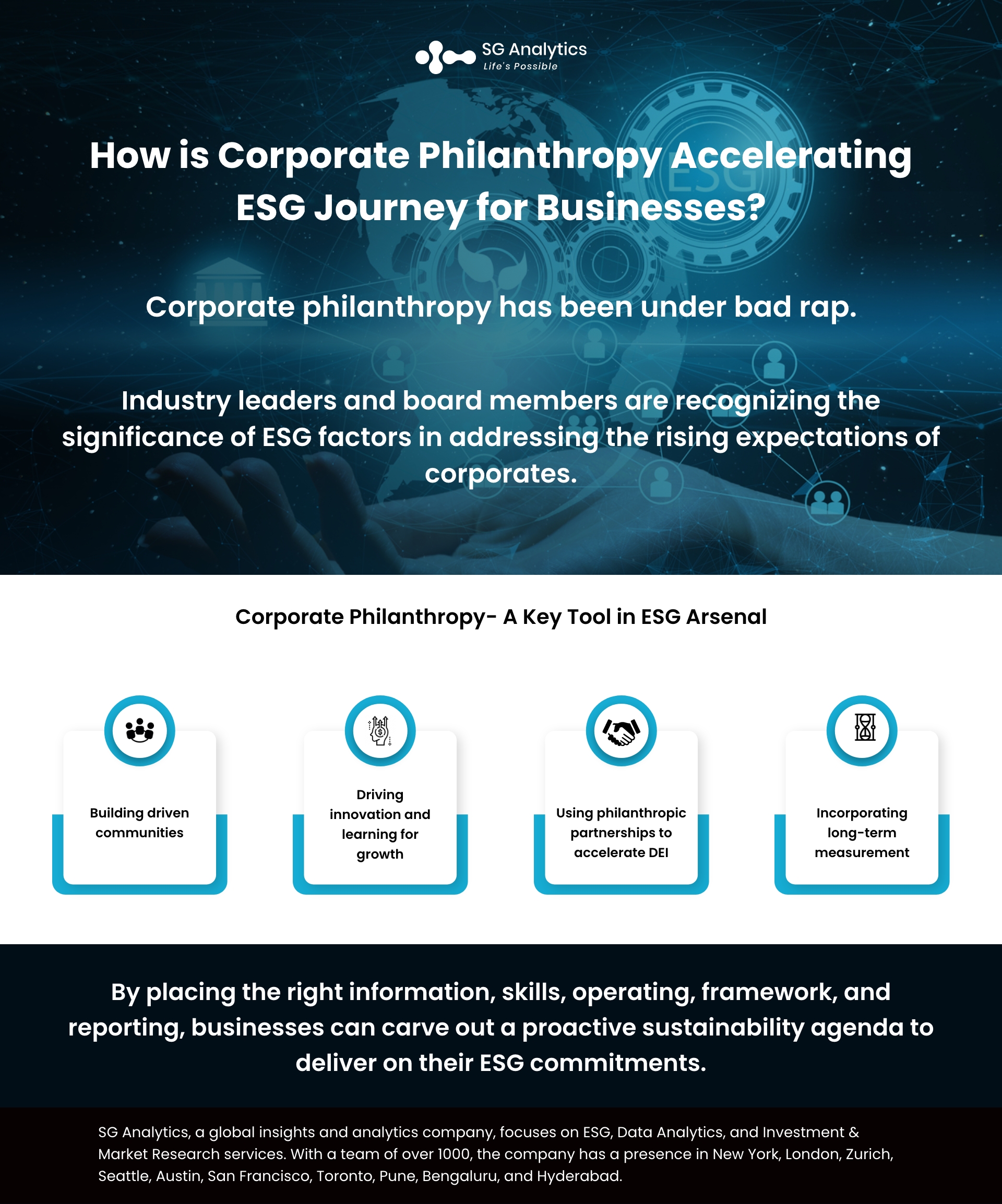For years, corporate philanthropy has been under bad rap. It has been perceived as a tool for buying goodwill in communities but as a smokescreen to deflect negative attention. The world of philanthropy is becoming synonymous with purpose washing. But due to the Covid-19 pandemic, corporate philanthropy got the desired limelight. And the good news is - it is finding a purposeful footing.
Today, industry leaders and board members are recognizing the significance of ESG factors in addressing the rising expectations of corporates.
-
Almost 84% percent believe that the COVID-19 pandemic has increased stakeholders' expectations from their company to drive societal impact as well as environmental sustainability and growth.
-
86% say that a focused approach to ESG and sustainable growth will be critical to building trust with their stakeholders.
Corporate philanthropy is considered the highest-risk capital for a company. It can be walled off from the day-to-day pressures of business and is subject to shareholder expectations. This made philanthropy the most flexible form of capital a company can deploy. To address social and environmental challenges, businesses are exploring opportunities to incorporate Diversity, Equity, and Inclusion (DEI) into governance and branding. The insights derived from learning have enabled them to fine-tune the ESG vision.

Read more: How is Multi-stakeholder Assessment Helping to Create Long-Term Sustainable Value?
A key factor to driving long-term, sustainable growth, robust governance is emerging as the key to meeting changing stakeholders’ expectations, along with building risk resilience and seizing new opportunities for growth. With the need for strategic decision-making rising, businesses are effectively balancing their near and long-term value creation.
Trust and Transparency
Businesses are effectively reporting their ESG values to steer the business and foster investor engagement. Corporate ESG reporting is expected to include enhanced and material disclosures alongside other mandatory information to demonstrate how an organization is driving value for its stakeholders. There has been constant pressure on corporates as well as their leaders to enhance their ESG reporting – ranging from equity investors and insurers to lenders and asset managers. These stakeholders are voicing their opinions for a more detailed insight into ESG factors incorporated by businesses to assess the full impact.
CEOs and boards are moving to meet stakeholders’ expectations and articulate a narrative to create long-term value. A recent EY Global survey highlighted that 74% of CFOs and finance leaders had witnessed an acceleration and shift from traditional reporting to an enhanced reporting framework for ESG reporting in the past 12 months.

Incorporating Long-term Measurement
With companies embedding ESG principles into their business, they are grappling with the new transition from a short-term to a longer-term view of ESG value creation. However, this requires a rigorous approach in areas with maximum impact measurement, as most companies require more experience. Philanthropic leaders have a long history of designing theories to change models that program toward a long-term view of impact.
Businesses are continuing to evolve monitoring, evaluation, & learning measures to hold stakeholders accountable for the outcomes. The business world is now exploring new opportunities for the philanthropic sector, thus building impact-measurement tools and frameworks for best practices.
Read more: Sustainability Outlook: Top Emerging Trends in 2023 and Beyond
Despite the recent backlashes, the incorporation of ESG is not going anywhere. And it is set to become a more critical tool for investors to measure as well as manage their risk to gain a competitive advantage in the war for talent and consumers. Corporations are now focused on aligning ESG values in their operational framework to gain positive societal outcomes. And corporate philanthropy is set to play a unique and vital role in this journey, thereby serving as a place for bold action and deep learning.

Corporate philanthropy- A Key Tool in ESG arsenal
-
Building Driven Communities
The S in ESG took center stage during Covid-19. With front-line workers striving to keep the economy kicking and essential services flowing, new inequities were entrenched in the workforce and communities. And companies found themselves amid quick actions. Many used philanthropy to address this socio-economic crisis with an understanding to help communities thrive. They also provided pipelines for talent, customers, and critical infrastructure. Foundations were focused on wealth building for historically excluded communities. Small businesses are set to play a critical role in the economic health and vibrancy of communities. The philanthropic initiatives are enabling businesses to extend their services to small businesses that are struggling or recovering from the pandemic.
-
Driving Innovation and Learning for Growth
Companies are bringing philanthropy together with other assets of the corporation. They are creating a powerful combination of resources to solve the underlying ESG problems in new ways. Businesses are undertaking projects that talk and highlight their projects and partnerships as an incubation engine. The goal is to experiment with different ways to deliver social impact that others can learn from and contribute to.

It is time for businesses to identify and leverage the available resources and power of experts coupled with funding to scale community access to growth. With philanthropic innovation, they can undertake decisions in complex environments. And the learning curve is high. They can then incorporate the feedback into the business, informing innovation on the commercial side. Businesses are now able to channel learning and help advance their ESG framework.
Read more: Sustainability Data Strategy: Top Key Components for a Positive Impact
-
Using Philanthropic Partnerships to Accelerate DEI
Many companies are being compelled to commit funding to racial justice causes by leading quick-fix philanthropy and the scrutiny that is being impacted - especially in place of the more challenging work of constructing a diverse and inclusive workplace. Many companies are managing philanthropy to simultaneously invest in and learn from organizations working on anti-racism. Nonprofit businesses are practicing and promoting an open hiring talent model to employ people who face barriers to employment. Companies are working to incorporate hiring and training practices into an equitable and inclusive hiring model. Companies are adopting practices to bear these partnerships and replicate them in their businesses. Internal DEI work is becoming a meaningful accelerator for growth. It is therefore becoming vital to establish a workplace culture that fosters an engaged and brand-proud workforce.
-
ESG Opportunity and Risk to Create Long-term Value
The risks related to ESG topics – range from resource dependency to scarcity linked to biodiversity loss or disruption from environmental issues like extreme weather events. Organizations are facing these profound challenges today.

To create and protect sustainable long-term value, organizations are now employing an internal control and risk management framework to mitigate this crisis and institute new parameters to track and maintain performance, thus securing the long-term future of the organization. However, leading companies are also discovering new revenue and growth opportunities with the markets becoming competitive and the ESG landscape evolving. Organizations are driving new revenue growth from ESG-conscious consumers, and this is being perceived as the main advantage of incorporating ESG into corporate strategy.
Read more: The ESG Rating Phenomenon: A Guide to Understand ESG Ratings
Looking Forward to Installing a Sustainability Agenda

Today, the ESG agenda is enabling organizations to unlock long-term value needs that are tied to business strategy, along with governance. Unless ESG values are integrated at the heart of governance, their chances of long-term success will be undermined. Hence, there needs to be a spirit of collaboration as sustainability transformation is giving rise to best practices. And with market participants giving constructive feedback, organizations are employing responses that need to be proportionate responses for new reporting standards to paint a different picture of a company’s ESG opportunities and risks.
By placing the right information, skills, operating, framework, and reporting, businesses can carve out a proactive sustainability agenda to deliver on their ESG commitments.
With a presence in New York, San Francisco, Austin, Seattle, Toronto, London, Zurich, Pune, Bengaluru, and Hyderabad, SG Analytics, a pioneer in Research and Analytics, offers tailor-made services to enterprises worldwide.
A leader in ESG Services, SG Analytics offers bespoke sustainability consulting services and research support for informed decision-making. Contact us today if you are in search of an efficient ESG integration and management solution provider to boost your sustainable performance.









